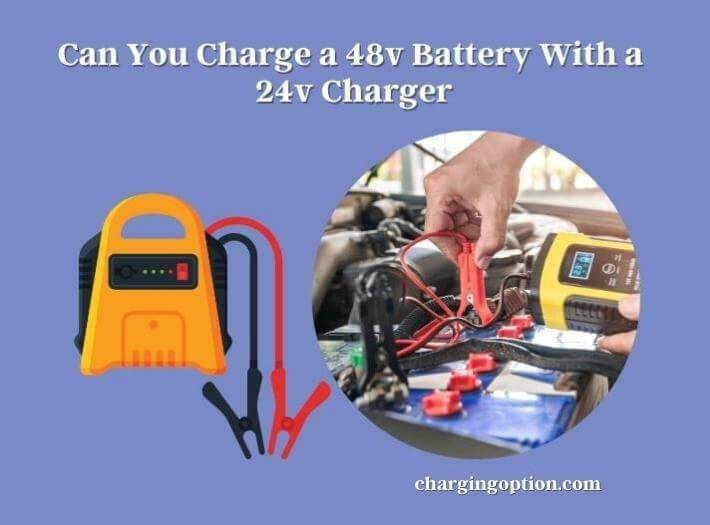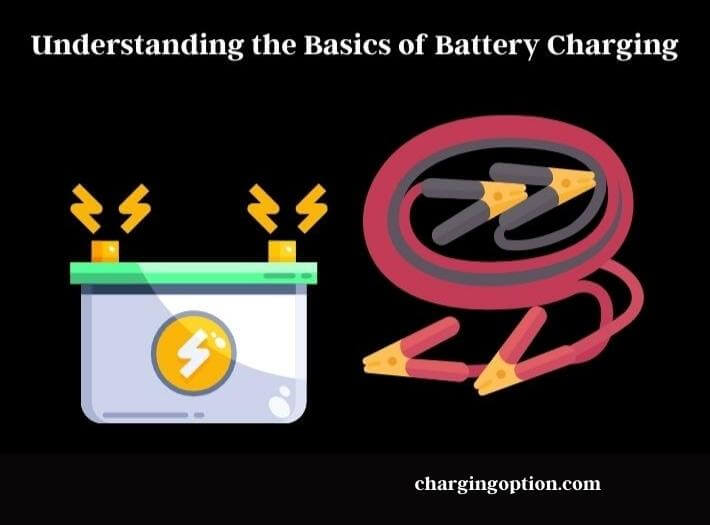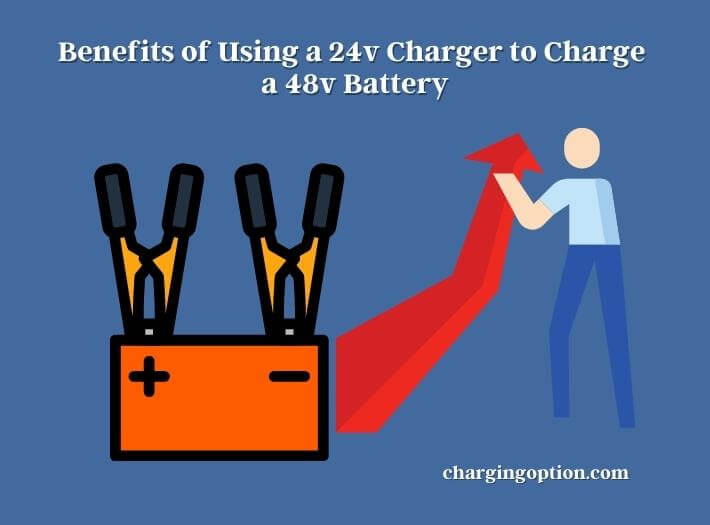Batteries are essential in powering devices, from small electronic devices to large electric vehicles. With the demand for energy-efficient and cost-effective power solutions increasing, battery technology has become more advanced. One issue frequently arises whether you can charge a 48V battery with a 24V charger. It is technically possible, but it is not recommended due to several risks associated with the process. This article explores the risks of charging a 48V battery with a 24V charger.

Before diving into the topic, it is vital to understand how batteries and chargers work. A battery stores chemical energy and converts it into electrical energy, and a charger supplies the chemical energy in the battery. Confused? See this video:
Voltage plays a critical role in the charging process, as it indicates the amount of electrical potential energy a battery can store and the amount of electrical energy a charger can supply. In the following sections, we will discuss the risks of charging a 48V battery with a 24V charger and the precautions you can take to avoid damage to your battery.
Understanding the Basics of Battery Charging
Before diving into the specifics of charging a 48V battery with a 24V charger, it is essential to understand some basic principles of battery charging.

A battery charger is a device that provides electrical energy to a battery to replenish the chemical energy stored within it. The charger delivers an electrical current to the battery, which drives a chemical reaction that stores energy in the battery’s cells.
The amount of energy a battery can store is determined by its voltage rating, typically specified in volts (V). A higher voltage rating indicates that the battery can store more energy, and a lower voltage rating suggests it can store less.
When charging a battery, it is vital to use a charger designed for the same voltage rating as the battery. For example, a 48V battery should be charged with a charger that is rated for 48V.
Using a charger rated for a different voltage can lead to several problems:
- The charger may not deliver enough energy to the battery to charge it fully.
- The charger may provide too much energy to the battery, which can cause it to overheat and potentially damage it.
- Using a charger that is not designed for the battery can result in a reduced lifespan for the battery, as well as decreased performance.
With this basic understanding of battery charging in mind, let’s look at the risks associated with charging a 48V battery with a 24V charger.
Can You Charge a 48V Battery with a 24V Charger?
Technically, charging a 48V battery with a 24V charger is possible. It is not recommended, as several risks are associated with doing so.
When charging a battery, the charger must supply enough energy to charge it fully. Using a charger rated for a lower voltage than the battery can result in insufficient energy being supplied to the battery. As a result, the battery may not fully charge, leading to reduced performance and a shorter lifespan.
On the other hand, using a charger rated for a higher voltage than the battery can lead to overcharging, which can cause the battery to overheat and potentially cause a fire. This is particularly dangerous when charging lithium-ion batteries, commonly used in many electronic devices and electric vehicles.
Using a charger designed for a different type of battery can cause compatibility issues and may damage the battery or charger.
It is technically possible to charge a 48V battery with a 24V charger, and it is not recommended due to the potential risks and damage that may occur. It is always best to use a charger designed for the specific type and voltage of the battery.
Benefits of Using a 24V Charger to Charge a 48V Battery
Unfortunately, there are no benefits to using a 24V charger to charge a 48V battery. As mentioned earlier, using a charger rated for a lower voltage than the battery can result in insufficient energy being supplied to the battery, leading to reduced performance and a shorter lifespan.

It is always best to use a charger specifically designed for the voltage rating of the battery being charged. This will ensure the battery receives the appropriate energy and is charged safely and efficiently.
Drawbacks of Using a 24V Charger to Charge a 48V Battery
As mentioned earlier, using a 24V charger to charge a 48V battery is not recommended, and several risks are associated. Here are some of the drawbacks of using a 24V charger to charge a 48V battery:
| Drawback | Explanation |
| Insufficient Energy Supply | A charger rated for a lower voltage than the battery may not supply enough energy to fully charge the battery, leading to reduced performance and a shorter lifespan. |
| Overcharging | Using a charger rated for a higher voltage than the battery can cause overcharging, which can result in overheating and potentially cause a fire. This is especially dangerous when charging lithium-ion batteries. |
| Compatibility Issues | Using a charger not designed for the specific type of battery can cause compatibility issues and may damage the battery or charger. |
| Void Warranty | A charger not designed for the specific type and voltage of the battery being charged can void the battery’s warranty. This can be costly if something goes wrong. |
It needs to note that using a charger not explicitly designed for the battery’s voltage rating can potentially damage it and even pose a safety risk. In summary, it is always recommended to use a charger designed for the specific type and voltage of the battery being charged to ensure safe and efficient charging, avoid potential risks, and extend the battery’s lifespan.
Factors Affecting the Charging Process
The charging process of a battery can be affected by several different factors, some of which include:
Battery Type
The type of battery being charged can significantly affect the charging process. Different types of batteries have different charging requirements, and using the wrong type of charger can result in reduced performance and shortened lifespan.
Charging Voltage
The voltage rating of the charger should match the voltage rating of the battery being charged. Using a charger with a higher or lower voltage rating can result in undercharging or overcharging the battery, leading to reduced performance, shorter lifespan, or even safety hazards.
Charging Current
The charging current is the rate at which energy is supplied to the battery during the charging process. It is essential to use a charger rated for the correct current level for the battery being charged. Using a charger with a lower current rating can result in slower charging times whilst using a charger with a higher current rating can damage the battery or cause safety hazards.
Temperature
The battery’s temperature during the charging process can affect the charging speed and efficiency. Charging a battery at too high or too low temperatures can reduce performance and shorten lifespan.
Age and Condition of the Battery
The battery’s age and condition can also affect the charging process. Old or damaged batteries may not hold a charge, as well as newer or well-maintained batteries.
Charging Time
The length of time the battery is connected to the charger can also affect the charging process. Overcharging a battery can result in safety hazards and reduced performance, undercharging can result in shortened lifespan and reduced performance.
Precautions to Take when Charging a 48V Battery with a 24V Charger
Charging a 48V battery with a 24V charger can be risky, damaging, or even pose a safety hazard. Therefore, it is essential to take some precautions when attempting to charge a 48V battery with a 24V charger. Here are some precautions to keep in mind:
Check the Charger Voltage Rating
Before charging a 48V battery with a 24V charger, ensure the voltage rating is correct. Using a charger with a voltage rating that is too low can lead to undercharging during using a charger with a voltage rating that is too high can result in overcharging and damage to the battery.
Monitor the Charging Process
Keep a close eye on the charging process and monitor the battery voltage to ensure it does not exceed its recommended voltage level. Monitoring the battery temperature during charging is essential to prevent overheating.
Use a Charge Controller
A charge controller can help regulate the charging process and prevent overcharging. It can also help protect the battery from damage and prolong its lifespan. It’s important to know that you can use a solar charge controller without a battery.
Use a Voltage Booster
A voltage booster can increase the charger’s voltage to match the battery’s charging voltage. This can help prevent undercharging and ensure the battery is charged to its total capacity.
Consult with a Professional
If you need help charging your 48V battery with a 24V charger, it is best to consult a professional who can guide you through the process and help you avoid any potential risks.
Final Thoughts
Charging a 48V battery with a 24V charger is possible, but it comes with certain risks and limitations. Using a lower voltage charger may be tempting, but it is vital to understand the risks involved and take the necessary precautions to ensure a safe and efficient charging process.
Factors such as the charger voltage rating, battery capacity, and charging time must be considered to avoid damage to the battery or any safety hazards. It is recommended to use a charger with a matching voltage rating to the battery being charged or consult a professional if you are unsure about how to charge your 48V battery with a 24V charger.
Read more:
